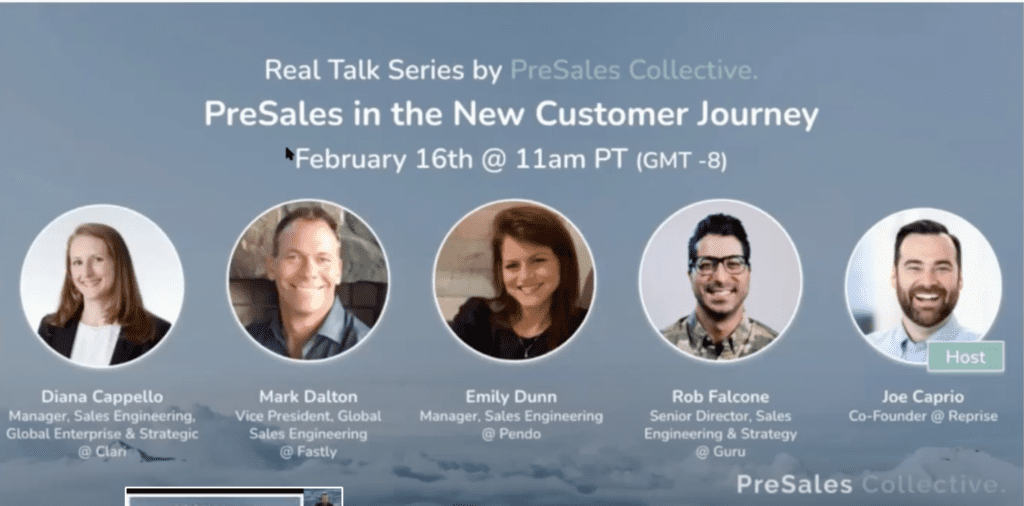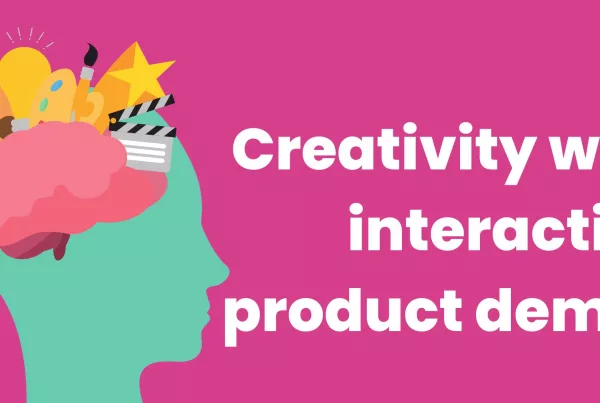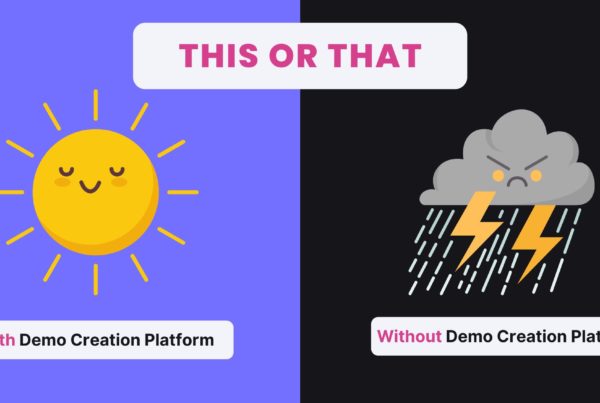The way buyers want to buy has changed forever. That’s partly a result of product-led growth exploding in the last few years, and it’s only accelerated by the impacts of the current global pandemic. That means the role of PreSales has changed too – and that’s exactly what we tackled in the latest Real Talk webinar series with the PreSales Collective.
Our insightful and very honest panelists this time were:
- Rob Falcone – Senior Director, Sales Engineering and Strategy at Guru
- Mark Dalton – Vice President, Global Sales Engineering at Fastly
- Emily Dunn – Manager, Sales Engineering at Pendo.io
- Diana Cappello – Manager, Sales Engineering at Clari
All the following opinions are the views of the panelists, not their companies!

The Rise of Product-Led Growth
PLG is the hottest buzzword in the SaaS industry these days. Some of us love it, some of us loathe it – but pretty much everyone seems to have a strong opinion on it. But there’s a more nuanced conversation around it that should be happening, especially as it applies to PreSales.
Product-led isn’t just offering a free trial – it’s leading with your product in a hundred ways instead of forcing your buyers to go through the same sales-led motion every time. There are so many ways to think about PLG instead of the current one-size-fits-all model.
- There’s land and expand – a free seat or two, then work towards expansion.
- There’s freemium – where you offer up a feature as a free, standalone product.
- There’s the ‘Try Now’ as your website CTA, which just skips the first two sales steps.
- You’ve got the mature vendors that sell add on SKUs to existing customers.
- And those are just the top of your PLG funnel! Product-led behaviors are permeating your entire process, beyond just your lead source/CTA.
It’s not just low-price, low-complexity options that are product-led anymore – just check out industry giants like Hubspot. PLG is about the buyer’s journey, not just giving things away for free.
PLG is how buyers buy in their personal lives. It’s always people making the purchase decisions for even the biggest enterprises – and they’re used to the user experience of Uber or Airbnb even in business purchases.
The Benefits of PLG for PreSales
While there’s plenty of resistance to PLG, it offers a whole bunch of benefits to SaaS businesses and their PreSales teams too.
PLG adds a layer of scalability – you can grow by having people explore your products on the schedule that fits for them instead of waiting for a free sales rep and sales engineer. Opening up an ability for customers to get to know your product before they talk to a sales rep makes sure no one is wasting their time – something PreSales never has enough of.
The buyer journey doesn’t all start with a sales conversation anymore. Buyers can use the tech in some way to educate themselves before you get them into the sales process now. And that sales process doesn’t need to go from one extreme to the other right now – there are options in between completely sales-led and completely product-led.
Some customers still expect a classic sales-led experience, especially enterprise customers. This is true for Clari, but Diana noted that though they do use a sales-led approach, they also offer a real trial using their actual data at a certain point in the process. That gives sales control, but also lets customers really try and experience the product before they buy.
Over at Pendo, Emily told us that they built self-guided tours of the product using Reprise on their website so buyers can see the product and how it works before they talk to sales. Of course, this wouldn’t work for more complex products, and they know that because they’ve tried and failed to do it in the past – then they pared down their product so it would work.
Guru has a gated freemium model up to a certain amount, and then payments kick in. They did a lot of work to determine what they should give away vs. what they should charge for. If you’re thinking about doing the same, think deeply about it before you go all in on it. Most SaaS companies don’t get it right the first time around, so do some experimenting to see what works.
One thing we all agreed we love – when websites give you an opportunity to both touch the product and learn and also talk to a sales rep. People buy in different ways – give options for both!
How does this change customer interactions?
People show up to sales calls now having actually touched and experienced the product. That’s a huge shift in the entire sales process. How can we in PreSales and sales provide value on top of what you can do on your own?
Our panelists agreed it’s now more about upselling and less about discovery. Buyers might already see some value if they’ve used your free trial or website tours, but there’s still a place for sales to point out added value that might not be immediately apparent.
Buyers now expect to have a different conversation. That means sales can’t just have the same calls script over and over again: you gotta get right to the point of what each individual buyer wants. Stay mindful – PLG means a lot of people have actually used your product and then come to talk to you. They don’t want to sit through a sales script about basic features.
Buyers also expect a free trial or access now because competitors are offering it – it’s harder to have a totally sales-led process for too long. Buyers expect to see and try the product at a much earlier stage now.
Adapting to the PLG Mindset
Our panelists agreed – you need to adapt in some way to PLG or your business will fall behind. But there are multiple ways to make that adjustment that could work for your company.
It doesn’t matter so much how your company feels about PLG, though most SaaS businesses right now seem to have plenty of feelings about it and want to stick to their process. But buyers don’t care about your process or your feelings – the way they want to buy things has already changed. You need to keep up somehow with this new world.
Buyers also have a new sense of urgency – buyers want to see your product and they want to see it right now. Guru doesn’t make users go through a demo before they offer more info or guidance anymore. Instead, they let the buyer start where they want and stay flexible. They adapt to the way their buyers buy.
And a big concern about PLG in the past has been how to stop competitors from copying your product if you let anyone on the internet try it. This fear comes from a mindset companies need to get over. Copying is actually validating you’re offering what the market wants. Focus instead on satisfying your customers and delivering what they want, and don’t worry too much about who’s copying what.
Tune In Next Time
Want to hear every juicy detail we discussed in the webinar? There’s tons more detail and info you don’t want to miss – so check out the full replay on YouTube.
And stay tuned for our upcoming Real Talk webinars too – as part of our new partnership with PreSales Collective, we’ll be sharing lots more events and knowledge in 2021.
Photo by Matt Howard on Unsplash

Joe Caprio is a cofounder at Reprise.
He also advocates for ICW, ask him about it!





